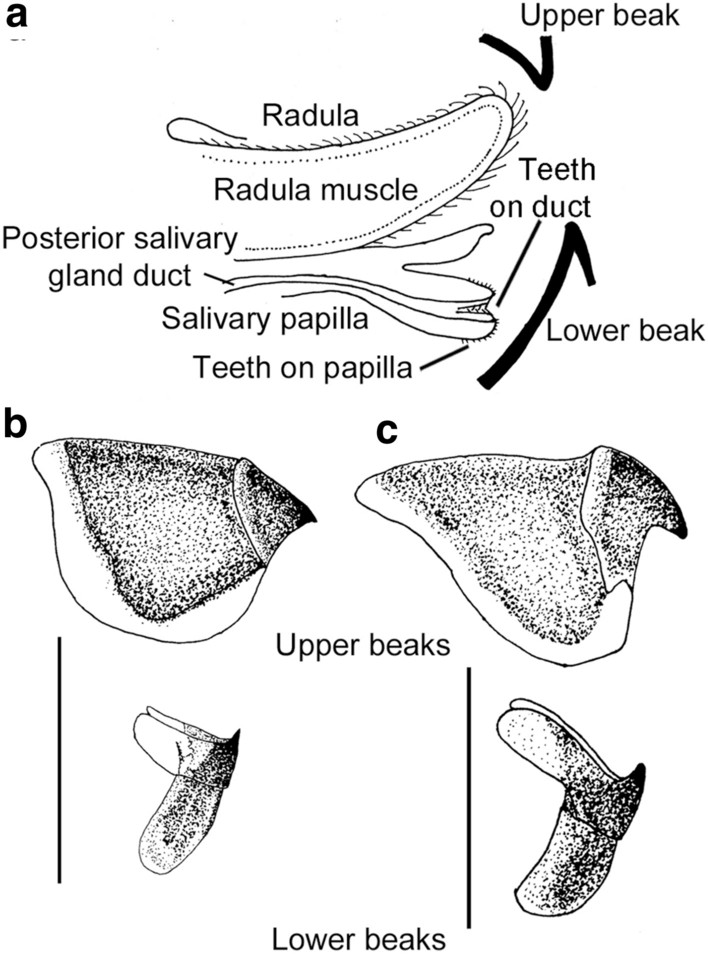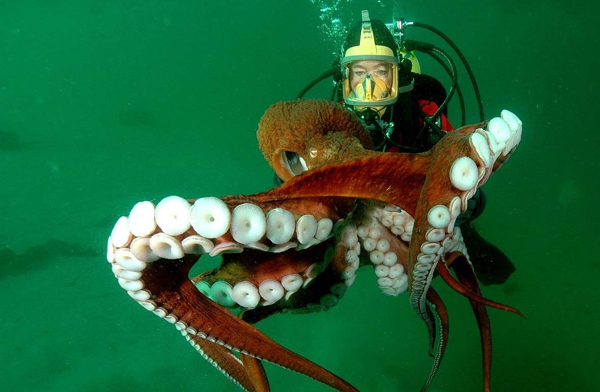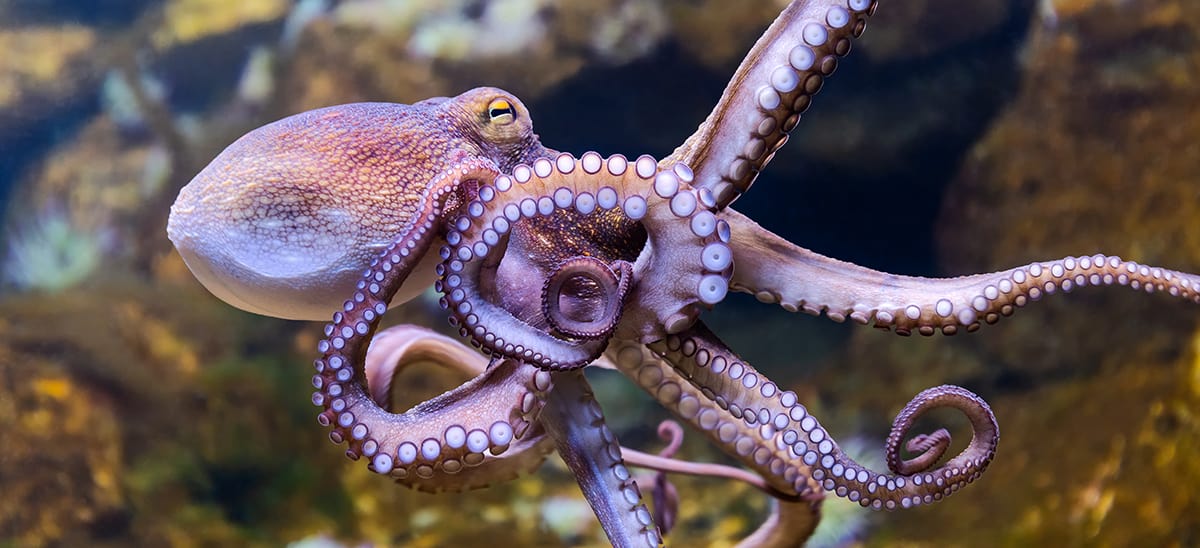Octopuses have teeth. But their teeth are not like ours. As you all know, octopuses possess radula; there are teeth. These teeth are called radula teeth. Radula teeth come in use in different operations efficiently.
Yes, you can argue on the topic “Do octopuses have teeth” Maybe they have regular teeth but they got effective ones.
How their teeth work, what they eat, how their teeth help them to survive and many more aspects will be clearly discussed. If you are an octopus enthusiast or just love to explore new things, keep reading. These facts will blow your mind.
Octopus Anatomy

Octopuses belong to the class Cephalopoda. Most animals of this group are soft-bodied and categorized with a large head(mantle). Octopuses don’t have teeth like humans or cows. They have a mighty beak with radula to tear apart the flesh of their prey and chew.
Octopus Meal
This marine monster has diverse food habits. Octopuses are carnivores. They eat crabs, small fishes, and sometimes bigger sea creatures.
Octopuses are smart sea creatures. They hunt with different techniques. They are masters of camouflage, mimicry, and ambush technique. Hunting is not hard for them!
How Octopuses Eat
Octopuses have great eyesight. They can see and hunt shrimps, crabs, and molluscs. Their sucker arms help them to capture and immobilize their food.
In the meantime, they use their beak to bite their prey. Octopuses scrape out the flesh of the prey with a radula. If the prey is larger, they use their arms to guide it in their mouth.
An octopus’ stomach stretches and absorbs enormous prey for digestion. Nutrients from digested food reach the circulatory system. Then they are distributed throughout the octopus’s body and help them to survive.
The Beak and Biting Mechanism
The beak is located at the centre of an octopus’ arms. It is the primary organ involved in the ingestion of food. This structure is analogous to the beaks found in birds.
However, octopuses possess a unique biting mechanism. The beak is made of chitin. Chitin is a hard material similar to the insects’ exoskeletons. This beak is incredibly strong and allows the octopus to tear through the tough shells of its prey.
Role and Function of Radula
The radula is a tongue-like organ full of small teeth. They look like ribbons and most species have radula teeth. The radula serves multiple purposes in the feeding process of an octopus.
It assists in scraping flesh from the prey, collecting food particles, and transporting the food to the esophagus. The texture and the arrangement of teeth help to manipulate and process a wide variety of food sources effectively.
Octopus Teeth
Octopuses don’t have teeth in their mouth. However, their radula is totally crafted with teeth. So do octopuses have teeth? There is actually no straight answer to this question.
Toothed octopus
There are some species with teeth in their radula. Octopus vulgaris is a renowned species. They have sharp radula teeth.
Radula teeth are pointy and curved. These teeth are employed for prey capture and manipulation. They also help for eating hard-shelled species.
Hapalochaena spp (blue-ringed octopus) and Enteroctopus dofleini (the giant pacific octopus ) are well-known toothed octopus species.
Toothless Octopus
Octopuses are strange animals. They will never fail to surprise you. You can surprisingly see the smooth radula of an octopus.
The blanket octopus (Tremoctopus spp), The mimic octopus (Tremoctopus mimicus) don’t have any teeth in their radula. They have adapted themselves to different feeding habits.
Toothless octopuses eat relatively soft-bodied animals. They hunt by enveloping or entangling their target.
Length of Octopuse Teeth
The length of the beak can vary among different species of octopuses. The beak has two crests: the upper crest and the lower crest. The measurement of the beak length is often expressed as an index of the upper hood, known as UhL (upper hood length).
The range of UhL can vary from 2.2 to 12.9 mm, indicating the variability in beak size among different octopus species. The upper crest height can range from 8.3 to 44.0 mm, while the lower crest height falls between 4.4 to 22.5 mm.
Are Octopuses Deadly?
Octopuses produce venoms that are not deadly to humans. But some species like the blue-ringed octopus, can be more potent poison.
Their venom contains a powerful neurotoxin. These venoms can cause respiratory failure and paralysis.
What to Do if You Encounter an Octopus?

Octopuses fear humans. But it is possible somehow you encounter an octopus. Let’s see how you can save yourself:
1. Keep Your Cool
A cool head can produce and execute ideas. So try to remain calm. If you panic and do something foolish there are high levels of injury chances.
2. Move Slowly
Try to move slowly and go as far as possible from the octopus. Don’t rush!
3. Press tentacles
If you can’t avoid conflict and octopus arms are wrapping you, apply pressure to its arms. Continuous pressure forces the octopus to untie its arms.
4. Lean
Octopuses normally stay in their den. They hesitate to come out. Try to lean back. This will get the octopus out of its shed. Otherwise, it will avoid following you.
Conclusion
There are teeth of octopuses. These teeth are necessary for the living of octopuses. If you look closely, you will discover facts. But if you want a direct answer, I should say octopuses don’t have teeth. Don’t have teeth in the traditional sense.
However, I have discussed the details of octopus teeth and how they use them to survive. Octopuses are fascinating, right?
FAQ
1. Do octopuses have real teeth?
No, they don’t have traditional teeth. But they have radula teeth for assistance.
2. Do all the octopus species have similar kinds of teeth?
There are noticeable changes in the teeth of octopuses depending on their species and size. They adapt themselves with their structure to survive in different conditions.
3. Are octopus teeth constantly replaced?
Yes, octopuses have a remarkable ability to replace their radula teeth throughout their lifespan continuously. As older teeth wear down or break, new teeth grow in to ensure the radula remains functional for feeding purposes.



